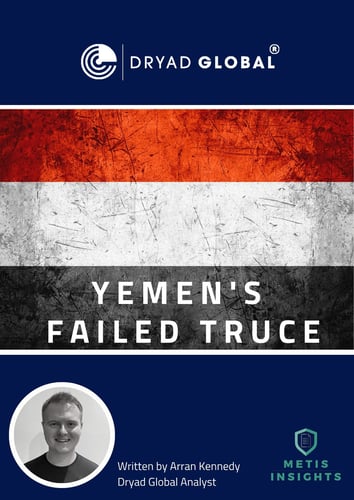
Now that the war against the Houthis appears to be nearing an end, the head of the Southern Transitional Council is making his move to push for Southern independence.
Over the past few months, even as Saudi Arabia and the Houthis have inched closer to a peace deal in the North, the struggle for Southern Yemen has intensified and is threatening to tip into open conflict. Like the broader war in Yemen, there is both a regional and local dimension to the battle.
On the regional side, Saudi Arabia is eager to exit Yemen but only if it can guarantee certain outcomes. When Saudi Arabia entered the war in March 2015, its stated goal was to remove the Houthis from Sanaa and restore then-President Abd Rabbu Mansour Hadi to power. But over time, and as Saudi Arabia’s military proved less capable than expected, those goals evolved. Hadi is gone, pushed out by Saudi Arabia and the United Arab Emirates in April 2022, and Saudi Arabia now appears willing to accept Houthi rule in Northern Yemen.
What Saudi Arabia is unwilling to accept, however, is a South controlled completely by the Southern Transitional Council, which would leave a number of Saudi allies out in the cold. Instead, Saudi Arabia insists that the Presidential Leadership Council, the odd eight-man grouping of political rivals that was formed in the aftermath of Hadi’s resignation, jointly rule the South.
Not surprisingly, the UAE, Saudi Arabia’s onetime partner though increasingly its rival in Yemen, takes a different view. The UAE strongly backs the Southern Transitional Council and is adamantly opposed to the Islah Party, which holds a seat on the Presidential Leadership Council and is affiliated with the Muslim Brotherhood, which the UAE views as a terrorist organization.
The Presidential Leadership Council was designed to paper over the cracks that had appeared in the anti-Houthi alliance, with Saudi Arabia and the UAE each selecting four members. Saudi Arabia backed primarily Northern candidates: Rashad al-Alimi, a former interior minister who was named head of the Presidential Leadership Council, as well as Sultan al-Arada, the governor of Marib, Abdullah al-Alimi (no relation to Rashad), a member of Islah, and Othman Mujali, a member of Yemen’s Parliament from Saada. The UAE, on the other hand, supported a trio of Southern candidates and one Northerner based in the South: Aidarous al-Zubaidi, the head of the Southern Transitional Council, Faraj al-Bahsani, then governor of Hadramout, and Abd al-Rahman Abu Zaraa al-Mahrami, a commander of the UAE-backed Giants Brigades, along with Tariq Saleh, nephew of the late former President Ali Abdullah Saleh.
Not surprisingly, given the different political goals of the groups represented, the Presidential Leadership Council has failed to present a unified front against the Houthis. Instead, the council has split and fractured as each of the groups maneuvers to maximize its position.
The Southern Transitional Council advocates for an independent Southern state, which is at odds with the Presidential Leadership Council’s stated goals. Abdullah al-Alimi of Islah, Rashad al-Alimi, and Saleh all pay lip service to the idea of a unified Yemeni state, but they are all working to ensure their group – opposed to independence in the South – comes out on top.
It was against this background that Zubaidi made his move in early May. At the end of a four-day conference in Aden, Zubaidi announced that he was restructuring the Southern Transitional Council leadership. Zubaidi, of course, would remain president. But instead of a single deputy, as had been the case in the past, he named a trio of vice presidents: Bahsani, Mahrami, and Major General Ahmed Saeed bin Brik.
Bahsani and Mahrami, of course, are also members of the Presidential Leadership Council, which means that the Southern Transitional Council now has a plurality of members on the presidential council. It also means that all three of the UAE’s Southern allies are now, at least ostensibly, on the same side. Abdulkhaleq Abdulla, a prominent Emirati commentator and government advisor, welcomed the moves, saying they laid the foundation for an independent Southern state.
Two other things stand out. Zubaidi’s selection of Bahsani as one of his vice presidents gives the Southern Transitional Council an important ally in Hadramout, a key southern governorate with oil and gas fields, which the Southern Transitional Council will need if it wants to realize its dream of an independent Southern state. The inclusion of Mahrami, the Giants Brigade commander, bolsters the Southern Transitional Council’s military wing, which is also likely to play an important role in the Southern Transitional Council’s push for independence.
Zubaidi continued to shore up support in Hadramout, laying the groundwork for independence, by naming Saleh al-Quaiti, the son of the last of the al-Quaiti sultans of Hadramout, as a special advisor and representative for foreign affairs. In the wake of that announcement, in late May, Saleh al-Quaiti’s father, Ghalib al-Quaiti, announced his “support for the Southern Transitional Council.”
Saudi Arabia, which borders Hadramout and realized the importance of Zubaidi’s moves, pushed back by establishing the Hadramout National Council in late June. The Hadramout National Council is merely the latest attempt by Saudi Arabia to graft its vision for Yemen onto the state itself. Typically, whether with the Presidential Leadership Council or other more local councils, these attempts have not worked well. Local residents tend to see through them, dismissing the groupings and leadership as bought and paid for by Saudi Arabia.
What is more concerning, however, is Saudi Arabia’s establishment of the National Shield Forces. The forces, which were announced in late January, report directly to Rashad al-Alimi, the head of the Presidential Leadership Council. Although intended to confront the Houthis, these forces may eventually find themselves in conflict with the Southern Transitional Council, particularly if Zubaidi continues to undermine Rashad al-Alimi and the Presidential Leadership Council in his push for independence.
Zubaidi has been clear from the moment the Southern Transitional Council was formed in 2017 that he would accept nothing less than an independent Southern state. For years, given the fighting against the Houthis, that goal seemed impossible. But now that the war against the Houthis appears to be nearing an end, Zubaidi is arranging the chessboard and making allies.
It won’t be easy, and it will likely involve a fight with fellow members of the Presidential Leadership Council, but for the first time in more than two and a half decades, Southern independence is more than a dream.
Source: AGSIW
Related Posts
Operation Aspides, or the Peril of Low..
Yemen's maritime borders have emerged as a flashpoint in the ongoing Gaza conflict, where the..
The battle for control of Yemen's ports
The maritime objectives of Saudi Arabia and the UAE have played a key role in determining the war's..
Houthis strike Saudi oil giant’s facilities in..
Yemen's Houthi rebels claimed that they hit an Aramco oil facility in eastern Saudi Arabia on..





